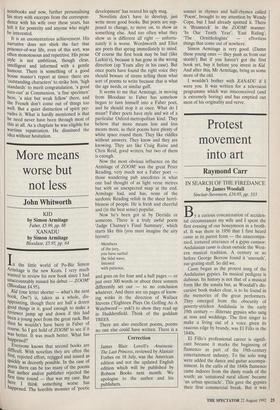More means worse but not less
John Whitworth
KID by Simon Armitage Faber, £5.99, pp. 88 XANADU by Simon Armitage Bloodaxe, £5.95, pp. 64 In the little world of Po-Biz Simon Armitage is the new Keats. I very much wanted to review his new book since I had unaccountably missed his debut — ZOOM! (Bloodaxe £4.95). Kid (one letter shorter — what's the next book, Om?) is, taken as a whole, dis- appointing, though there are half a dozen good things in it, good enough to make a reviewer jump up and down if this had been a young poet from the great ruck. But then he wouldn't have been in Faber of course. So I got hold of ZOOM! to see if it was better. It was much better. What has happened?
Everyone knows that second books are difficult. With novelists they are often the first, rejected effort, rejigged and issued as quickly as decently possible. In the case of Poets there can be too many of the poems that author and/or publisher rejected the first time round — that was my case. But here I think something worse has happened. The horrible monster of 'poetic development' has reared his ugly mug.
Novelists don't have to develop, just write more good books. But poets are sup- posed to change, to move on, to show us something else. And too often what they show us is different all right — unfortu- nately it is worse. Wordsworth and Eliot are poets that spring immediately to mind. Of course the first book may be bad (like Larkin's), because it has gone in the wrong direction (up Yeats alley in his case). But once poets have found the right voice they should beware of sirens telling them what sort of poems to write because that is what the age needs, or similar guff.
It seems to me that Armitage, in moving from Bloodaxe to Faber has somehow begun to turn himself into a Faber poet, and he should stop it at once. What do I mean? Faber poets have style and wit of a particular Oxford-metropolitan kind. They believe that more means less and less means more, so their poems have plenty of white space round them. They like riddles without answers. They know and they are knowing. They are like Craig Raine and Chris Reid, good writers, but two of them is enough.
Now the most obvious influence on the Armitage of ZOOM! was the great Peter Reading, very much not a Faber poet those wandering pub anecdotes in what one had thought of as light verse metres but with an unexpected snap at the end. Armitage had, and has, none of the sardonic Reading relish in the sheer horri- bleness of people. He is fresh and cheerful and (in the best sense) popular.
Now he's been got at by Derrida or someone. There is a truly awful poem `Judge Chutney's Final Summary', which starts like this (you must imagine the airy layout):
Members of the jury, you have surfed the tidal wave, listened with patience,
and goes on for four and a half pages — or just over 300 words or about three sonnets differently set out — to no conclusion whatever. And there are six pages of know- ing winks in the direction of Wallace Stevens (Eighteen Plays On Golfing As A Watchword'— yuk!) to show they read up in Huddersfield. Think of the goddam
TREES.
There are also excellent poems, poems no one else could have written. There is a sonnet in rhymes and half-rhymes called `Poem', brought to my attention by Wendy Cope, but I had already spotted it. There is 'Brassneck' in the ZOOM! manner. `In Our Tenth Year', 'East Riding', `The Ornithologists' — effortless things that come out of nowhere.
Simon Armitage is very good. (Damn these young ones — they push us from our stools!) But if you haven't got the first book yet, buy it before you invest in Kid. And after this, Mr Armitage, bring us some more of the old.
I wouldn't bother with XANADU if I were you. It was written for a television, programme which was misconceived (and is extremely boring) and has emptied out most of his originality and verve.










































 Previous page
Previous page